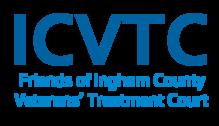








Founded in 1895, the Ingham County Bar Association continues its longstanding tradition of service to the legal profession and the greater Lansing community, bringing lawyers together to join in a strong organization that works to achieve objectives that transcend the individual.
P.O. Box 66
Grand Ledge, MI 48837 www.inghambar.org
President
Stephen Sinas
Sinas Dramis Law Firm
President-Elect
Lindsay Dangl
Murphy & Spagnuolo PC
Vice President
Alexander Rusek
Foster Swift Collins & Smith PC
Treasurer
Jessica Zimbelman
State Appellate Defender Office
Secretary
Mary Bowen
Attorney Grievance Commission
Immediate Past President
Pamela Amato
Mallory Lapka Scott & Selin, PLLC
Ernscie Augustin
Augustin Law Offices
Jacquelyn Dupler
Foster Swift Collins & Smith PC
Nolan Erickson
Grewal Law PLLC
Lauren Kissel
Sinas Dramis Law Firm
Lynn Osborne
Osborne & Barrett PLLC
Ted Seitz
Dykema Gossett PLLC
Marisa Vinsky
Chartier & Nyamfukudza PLC
Chris Wickman
The Nichols Law Firm PLLC
Bankruptcy Law
Lynn Osborne
Osborne & Barrett PLLC
Criminal Defense Law
Takura Nyamfukudza
Chartier & Nyamfukudza, PLC
Marisa Vinsky
Chartier & Nyamfukudza, PLC
Chris Wickman
Nichols Law Firm, PLLC
Employment & Labor Law
Kelly McClintock
Blanchard & Walker PLLC
Family Law
Jennipher Martinez
White Schneider Young & Chiodini, PC
Erica Terranova
Bailey & Terranova
Paralegal/Legal Assistant
Megan L. Cochrane
Foster Swift Collins & Smith PC
Lizzy Sailor
Chartier & Nyamfukudza, PLC
Probate & Trust Law
Ernscie Augustin
Augustin Law Offices
Real Estate Law
William D. Tomblin
William D. Tomblin & Associates
Ellen E. Ward
Oade Stroud & Kleiman PC
Mitchell Zolton
Fahey Schultz Burzych Rhodes PLC
Young Lawyers
Marisa Vinsky
Chartier & Nyamfukudza PLC
Annual Dinner
Lindsay Dangl
Annual Meeting
Lindsay Dangl
Ask A Lawyer
Raymond Harris / Brandon Schumacher / Chris Wickman
Awards
Jacquelyn Dupler / Mary Bowen
Barristers
Lauren Kissel / Marisa Vinsky
Bench Bar - Mary Bowen / Nolan Erickson / Lynn Osborne
BRIEFS Board
Diversity, Equity & Inclusion
Kristina Bilowus / Jessica Zimbelman
Education
Chris Wickman
List Serve
Staff
Meet the Judges
Pam Amato / Ted Seitz
Membership
Jacquelyn Dupler / Lynn Osborne
Nominating Committee
Pam Amato
Past Presidents’
Pam Amato
Section Chair Liaison
Chris Wickman
Shrimp Dinner
Elias Kafantaris / Alexander Rusek / Michael Van Huysse
Social Deliberations
Jacquelyn Dupler
Social Media
Stephen Sinas / Staff
Sponsors
Ernscie Augustin / Lindsay Dangl / Alexander Rusek
EXECUTIVE DIRECTOR
Madelyne Lawry
517-627-3938
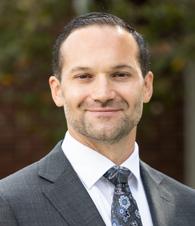 Stephen Sinas, ICBA President stevesinas@sinasdramis.com
Stephen Sinas, ICBA President stevesinas@sinasdramis.com
As our members know, the practice of law can cause us to feel like we are in a perpetual state of stress, worry, and sense of uncertainty. At any given time, a problem can arise with a case, with a client, with opposing counsel, or with a judge. We hope things will go according to plan, but, on many days, there is some sort of unexpected twist that alters those plans. As this unfolds over time, we can become increasingly stressed about our workloads, which makes it increasingly difficult to relax, engage with our family and friends, and generally enjoy our daily life. When stress becomes especially acute, it can cause a person’s life to unravel further, and, for some, can lead to dire consequences.
Well-being within the practice of law is now being focused on more than ever throughout the nation. As part of that national movement, in May 2022, the Michigan Supreme Court and the State Bar of Michigan created The Task Force on Well-Being in the Law (Task Force). The purpose of this task force is to address the well-being of legal professionals and law students. In August 2023, The Task Force presented a report in which it provides several recommendations to promote the well-
being of law students, lawyers, and judges. The report is accessible online and can be easily found on the Michigan Supreme Court’s website1.
The report also recommended that the Michigan Supreme Court establish a Commission to oversee and promote the well-being within the practice of law in Michigan. Accordingly, in September 2023, the Michigan Supreme Court created the Commission on Well-Being in the Law. The stated purpose of the Commission is to:
build upon the good work already accomplished by the Task Force and continue the forward momentum to change the climate of the legal culture by promoting wellbeing within the legal profession. The Commission will foster an environment that encourages members of the legal profession, law students, and court staff to strive for greater mental, physical, and emotional health.2
The Supreme Court’s efforts to promote well-being within the law should be applauded. Hopefully, those efforts will make a real difference for law students and legal professionals throughout Michigan.
Earlier this year, ICBA’s board recognized that ICBA has an opportunity
to use its role as a local bar association to help further promote well-being within our legal community. To further that effort, per the suggestion of our board member, Chris Wickman, our board unanimously voted to create a special committee now called the “Committee on Well Being in the Law.” The board has established that the purpose of this committee is to:
promote well-being within the legal profession in Ingham County. This committee will stay informed about the recommendations made by the Michigan Supreme Court’s Commission on Well-Being in the Law and consider whether ICBA could and should implement any of those recommendations within its operations as an organization. Additionally, the committee shall consider ways in which it can promote well-being within its membership, including, but not limited to, conducting seminars or other events that address issues related to well-being, publishing articles related to well-being, and producing informative digital and/ or social media content regarding well-being.
Following the formation of this committee, ICBA has tried to bring more awareness to issues related to
well-being within the law. For example, we have featured articles in Briefs and posted more on social media about this subject. And just a few weeks ago at the 2024 Bench Bar Conference, we had a Mental Health and Wellness Session led by Julie Dillon of Be Balanced Wellness Studio in which she, among other things, explained and demonstrated how movement and breathing exercises can be used to reduce stress on a regular basis.
ICBA hopes to build off our momentum and consider more ways ICBA can use its platform to promote well-being within our legal community. In the
meantime, there is a simple message we want to make loud and clear to our members: ICBA cares about you and wants to do what it can to help you succeed in practicing law in Ingham County and, at the same time, maintain your well-being. So, please reach out to us if there are better ways in which we can serve you in that respect. Please also watch for more information and events regarding well-being within the law. And please come to our events knowing that you will be warmly received and welcomed as a member of our legal community. On that note, please consider coming to our next Social Deliberations scheduled to take
place on Wednesday, April 24, 2024, at 5:30 pm at Hooked Bookstore and Coffee/Wine Bar located at 3142 E Michigan Ave, Lansing, MI 48912. There is no requirement to register. There is no agenda. It is just people in our legal community getting together for friendly conversation, which, as far as I know, is a pretty good basic way to support your well-being.
Endnotes
1 https://www.courts.michigan.gov/4a46c9/ siteassets/committees,-boards-special-initiatves/ lawyer-well-being/wbtf-final-report-.pdf
2 Michigan Supreme Court Adminstrative Order No. 2023-1 — Creation of the Commission on Well-Being in the Law.
* The criminal case law update will include Michigan Supreme Court decisions and substantive orders and published Court of Appeals decisions from the prior quarter. If there are specific topics a reader would like a deeper dive into, please email me at jzimbelman@sado.org
 Jessica Zimbelman jzimbelman@sado.org
Jessica Zimbelman jzimbelman@sado.org
Phillip Darga, Docket No. 363178, issued November 16, 2023: The Court affirmed Mr. Darga’s convictions for accosting a minor for an immoral purpose, finding there was sufficient evidence.
In re NC, Docket No. 361548, issued November 21, 2023: The Court affirmed the trial court’s suppression of NC’s statements, affirming NC was in custody and should have been given Miranda warnings.
Bobbi Godfrey, Docket No. 361770, issued November 21, 2023: The Court affirmed the imposition of tether fees, finding they were allowable under MCL 769.1k(2).
Dametrius Posey, Docket No. 345491, issued November 30, 2023: On remand from the Michigan Supreme Court, the Court affirmed Mr. Posey’s sentences, finding they were reasonable and proportionate.
Bobby Kennedy, Docket No. 363575, issued December 14, 2023: The Court held that People v Peeler, 509 Mich 381 (2022) (one-person grand juries do not have authority to issue indictments) applies retroactively.
Justin Duha, Docket No. 363115, issued December 14, 2023: The Court affirmed the trial court’s dismissal of the charges based on Michigan’s Good Samaritan Law, MCL 333.7403(3)(a). The dismissals were proper because even if the person does not ultimately need medical assistance, it looked to a layperson like the person needed assistance.
Christopher Murawski, Docket No. 365852, issued December 14, 2023: The Court remanded for the entry of an order granting the motion to quash because the arrest forming the basis of the resisting and obstructing charges was unlawful.
Corey Hawkins, Docket No. 365076, issued December 14, 2023: The Court held that the trial court abused its discretion in precluding the admission of defense expert testimony regarding bio-
mechanics, offered to rebut the prosecution’s theory that the injuries to the child were caused by multiple blows.
Richard Guichelaar, Docket No. 363588, issued December 21, 2023: The Court affirmed the upward departure sentences because Mr. Guichelaar voluntarily entered into a sentencing agreement with a specific range and the sentences were within the agreed-upon range.
Michael Thigpen, Docket No. 360351, issued December 28, 2023: The Court affirmed Mr. Thigpen’s convictions finding that: the prosecution’s expert ballistics testimony was reliable and trial counsel was not ineffective for failing to challenge that testimony or call an expert for the defense; the jury was properly instructed; and the convictions for felony-firearm and felon-in-possession did not violate Double Jeopardy.
Recondo Ventour, Docket No. 363922, issued December 28, 2023: The Court held that a trial court may increase a person’s sentence based on the conduct of a codefendant if that person would have been assessed the same number of points had the person been convicted of a charged offense, if the scoring is based solely on the codefendant’s conduct and not conduct for which the person was acquitted.
John Poole, Docket No. 352569, issued January 18, 2024: The Court held that the Supreme Court’s decision in People v Parks, 510 Mich 225 (18-year-olds cannot be mandatorily sentenced to life without parole) applied retroactively.
Christopher Schurr, Docket No. 365104, issued January 25, 2024: The Court affirmed the district court’s denial of the motion to quash the bindover on charges of second-degree murder in the death of Patrick Lyoya.
Khalif Bently, Docket No. 364303, issued February 8, 2024: The Court affirmed the restitution award, finding there was sufficient evidence of medical debt.
15th Annual Barristers
Thursday, March 14, 2024
U Club @ 6:00 p.m. - 8:00 p.m.
Social Deliberations
Wednesday, April 24, 2024
Hooked @ 5:30 p.m.
Annual Shrimp Dinner/Annual Meeting
Wednesday, May 15, 2024
VFW Post 701 @ 5:00 Reception p.m.
Dinner @ 6:00 p.m.
Social Deliberations
Wednesday, June 26, 2024
Hooked @ 5:30 p.m.
Social Deliberations
Wednesday, September 18, 2024
Hooked @ 5:30 p.m.
Ask A Lawyer
Thursday, October 17, 2024
Capital Area District Library @ 5:00-7:00 p.m.
130th Annual Dinner
Wednesday, November 13, 2024
University Club @ 6:00 – 8:00 pm
Social Deliberations
Wednesday, November 20, 2024
Hooked @ 5:30 p.m.
 Kristina Bilowus bilowusk@msu.edu
Kristina Bilowus bilowusk@msu.edu
 Chris Wickman cwickman@nicholslaw.net
Chris Wickman cwickman@nicholslaw.net
5 W’s and 1H? You’ve read about them in the papers. The newspapers, that is. These are the “reporter’s questions” – What, Who, Where, When, Why, and How. In this article, we apply these questions to the new court rule amendment on pronouns.
What - does the rule amendment say?
The last paragraph of MCR 1.109(D)(1) (b) now states:
Parties may also include Ms., Mr., or Mx. as a preferred form of address and one of the following personal pronouns in the name section of the caption: he/him/his, she/her/hers, or they/them/theirs.
Courts must use the individual’s name, the designated salutation or personal pronouns, or other respectful means that are not inconsistent with the individual’s designated salutation or personal pronouns when addressing, referring to, or identifying the party or attorney, either orally or in writing.
What – are the courts’ options?
A court may refer to a party or litigant as Ms., Mr., or Mx (Smith) as indicated in the caption. The court may also refer to someone as their title – e.g. Attorney (Smith) or Plaintiff (Smith). It is also appropriate for the court to ask, “How would you like to be addressed/how would your client like to be addressed?”
to the party or attorney – similar to how courts will sometimes ask the person or an attorney how a name is pronounced.
Who – does the rule apply to?
The language of the rule applies to “courts.” This term is not defined, but presumably most obviously applies to the judge, but likely also applies to staff, court officials, and others subject to the judge’s discretion and control – pursuant to Judicial Canon 3(A)(14).
This provision may also trigger duties to lawyers as well. Michigan Rule of Professional Conduct 6.5(a) reads, “A lawyer shall treat with courtesy and respect all persons involved in the legal process. A lawyer shall take particular care to avoid treating such a person discourteously or disrespectfully because of the person’s race, gender, or other protected personal characteristic.” Therefore, while the court rule may not be binding on anyone beyond the “courts,” should an attorney know a person’s pronouns and intentionally refer to them contrary to such, that lawyer may risk running afoul of MRPC 6.5(a).
Where – does the rule exist?
Michigan is the first state to adopt such a rule and applies in state courts.
When – did it go into effect?
January 1, 2024.
Why – was the rule adopted?
The eventual adoption of the Court Rule is seen as a response to the concurring Court of Appeals opinion in People v Gobrick and the responding concurrence in the Michigan Supreme Court. In the majority opinion in the Court of Appeals, the panel used “they” to refer to the defendant who identified as a transgender female who preferred the nonbinary or neutral pronouns “they/ them/theirs.” The concurring opinion in the Court of Appeals wrote separately to criticize the majority’s accommodation of the defendant’s pronouns. The Michigan Supreme Court denied the application for leave to appeal, but one justice wrote a concurring opinion to respond to why the majority opinion’s use of “they” was grounded in proper lexicon and important towards ensuring that courts are viewed as open and fair. An amendment to the Court Rule was proposed thereafter, and there were extensive comments made both for and against a proposed rule change. The language of the rule adopted was ultimately shaped by those comments.
For more discussion on why the exact rule was adopted, feel free to review the concurring opinions of Justices Bolden
and Welch found accompanying the order - http://tinyurl.com/pronounorder.
Why – does it matter how you refer to someone?
On top of professional obligations, there is one rule that trumps them all. Love thy Neighbor. Referring to someone as they identify is a matter of common courtesy that we all follow every day without a second thought. We have members in our community who go by a shortened version of their name (i.e. Chris), or a long version of their name (i.e. Kristina), individuals who go by their middle name, or who go by a maiden or married name. Calling them what they go by is no different – a sign of respect and acknowledgment of them. You wouldn’t argue with someone that their name is wrong, and this is no different. You may always refer to them through their title as “Attorney” or “Party” without disrespecting them.
How – do I apply this rule as an attorney?
First, figure out what your client’s pronouns are. This can be added to an intake questionnaire simply by asking what they go by or how they prefer to be addressed.
Second, add a portion to your pleadings – either under its own section called, “Pronouns” or under the identification of the parties and include he/him/his, she/ her/hers, or they/them/theirs. You may choose to include pronouns for all clients or only clients where identification by their proper pronouns matters to them.
Third, use your client’s pronouns appropriately. This may not always occur naturally but make a conscious effort to do so and others will follow suit.
There are multiple ways to pronounce this that are used. This can be pronounced as “Em-ex,” “Mix,” or “Mucks.” As with the rest of this article, the rule on this remains the same. The simplest way to find out how people prefer to be addressed is to ask them. Thanks for your interest in this topic and for continuing to treat people in our community with respect.
 William Frank Diedrich theroadhome@comcast.net
William Frank Diedrich theroadhome@comcast.net
If you’ve ever been canoeing or whitewater rafting, you know you can’t control the river. You don’t control the size of the waves, nor the speed of the flow, nor the weather that surrounds you. It is what it is. Reading about rivers is a start, but actual practice spent on the river makes you proficient. It teaches you how to respond to the river. It is the same with emotions.
You don’t control your emotions. You respond to them. You either accept or resist the tumult within you. Emotional Intelligence is the practice of responding effectively to your own emotional state. As stated in the two previous articles in this series, the following five elements make up the practice of emotional intelligence:
1. Awareness. Be aware of how you feel.
2. Accept how you feel. Without judgment, accept that your emotions exist, and they belong to you. No one else is to blame for how you feel.
3. Direct your emotions. That is, control what you do. For example, accept anger without necessarily acting on it. Breathe deeply and/ or move your body (walking, stretching, etc.) to release the pressure of demanding emotions.
4. Once you are in control of yourself, you can read the emotions of others.
5. With self-control and the ability to read emotions you can influence others in positive and productive ways.
Influence is not about managing other people’s actions. The only actions you need to manage are your own. If you blame your emotional state and your behaviors on someone else, then you are powerless, without influence. If you accept how you feel, even if someone else has acted aggressively toward you, then you are in a position to influence. Here are three practices that will help you to be emotionally intelligent, to manage your behavioral reactions, and to influence others.
Triggers are signals we receive that spark an emotional response. A trigger can be a word, a gesture, tone of voice, a look, a behavior, or a situation. The reaction is automatic. It’s automatic because the triggered emotion, anger, hurt, resentment, sadness, or whatever, is already within us. A trigger can also be internal, as in a thought about something unpleasant. We are accountable for our triggers. That is, regardless of how negative another’s behavior may be, we own our reaction.
Words to Consider continued
Let’s say a colleague tends to be arrogant in your perception. His contemptuous tone drives you to anger. You want to yell at him for his arrogance. But you don’t. You control yourself. Anger is exploding in your mind and body, but somehow you act unaffected. You appear to let it go, but you haven’t let it go. The anger is still within you. You may perceive that he caused your anger, but that is not the case. How can you resolve this for yourself?
First, be aware of your anger, and second, accept it. It isn’t right or wrong. It just is. Notice how the anger feels in your body. Breathe. Third, direct your anger toward something positive. Anger is energy. Stop thinking about why you’re angry and focus on the feelings. Take a walk, exercise, or get something done. Be with the anger. As you allow yourself to feel the anger without acting on it, without judging it, you will calm yourself. A trigger is an opportunity to heal something inside you. You heal the anger by feeling it, not by feeding it with drama.
Once you have reached some level of calm, ask yourself: What story am I telling myself about this? In other words, when you are triggered, there is always a story at work. It is most often subconscious. If your colleague or boss is arrogant, who cares? Whatever trait you assign to the person who triggered you, is that trait also in you? In this example, are you also arrogant in some way? Is your story that the person should not act this way? In reality, we live and work among people who often do not meet our preferences. They don’t act the way we think they should.
Once triggered, and the emotion is running wild inside you, stop. This is a pattern. Interrupt the pattern. A quote attributed to Viktor Frankl states: “Between stimulus and response lies a space. In that space lie our freedom and power to choose a response. In our response lies our growth and our happiness.”
The space between stimulus and response is nonexistent if you lack emotional intelligence. You’re triggered, and you react. Emotional intelligence is you creating that space. It’s you becoming aware of your reaction, your emotional state before you respond. It’s you being so aware that you stop yourself and observe what is happening within you. You accept it. You make a decision as to what you can do.
This is not easy. With practice, it becomes automatic. Someone says something. You are triggered emotionally. Because of your practice, you recognize that you’re temporarily out of control. You acknowledge and accept how you feel, without judgment. You make a decision regarding how you will respond. Maybe your response carries some anger. Maybe your response is to become completely calm, at peace, or undisturbed. Maybe you delay your response in order to process the emotions. However you respond, it is a conscious decision.
Here’s an example. I was angry because I received poor customer service. I’m on the phone with someone from the company. Part of me wants to yell at him and criticize the company. My story is: “They don’t think I’m important, otherwise they wouldn’t treat me this way. They don’t value me.”
I accept my anger without judgment. I recognize that this is a pattern. I often get angry when I don’t get what I want (or paid for!). I interrupt the pattern and ask myself: “What do I want to come of this?” That is, what is my goal? Is it the satisfaction of telling someone off? Is it to hurt the person I’m talking to as some kind of revenge? My goal is to get the product or service I ordered in a timely manner.
I have acknowledged and accepted my anger. I have recognized the story I’m telling myself. I see the pattern. Given that this is my practice, this whole process only takes a few seconds. I treat the person I’m talking to with great respect. I clarify what I want. I empathize with them and see the problem from their point of view. I ask for what I want—the product or service or my money back. I don’t always get what I want, just most of the time.
Here’s the secret: You cannot influence people in a positive way from a place of disconnection. Find a way to connect. Yelling and criticizing do not connect you. Most recipients of your anger will react to the emotion, not to what you need. Being clear and listening connect you. When a person feels that you see them, that you accord them respect, they can hear what you want or need more clearly. In most cases the person will want to help you achieve your goals if they feel a connection with you.
It’s not about being nice to everyone. Be truthful, but tell the kind truth. If a telemarketer calls, I will say I am not interested. If they object, I am not required to continue the conversation. I just hang up. We still have to deal with people who don’t care about our needs and goals. Their lack of care may trigger
Words to Consider continued a reaction in you, but it’s not about you. It’s about them. Do what is best for you and let them go. The triggered reaction is a gift. You are once again seeing something in you that needs to be healed. Use the tools you have to heal. You can be thankful to people who trigger you, because they are helping you to grow and learn.
Every triggered reaction is an opportunity to grow and learn, to build your emotional intelligence. You cannot control emotions when they arise, but you can navigate them by feeling and accepting them. You will find that
negative emotion is processed quickly in this way. This allows you to take the focus off you and your feelings, and your story, and place it on others. You can then respond to people in terms of their needs. When you help them get their needs met, they, in most cases, will want to help you get your needs met.
Like a rushing river, emotions are not controlled. We master our responses as a whitewater rafter masters his raft. He works with the river to arrive at his destination. Similarly, work with your emotions to accomplish your goals. Be aware and accept your emotions, and
become aware and accept the emotions of others. This is a practice. Through practice you become more proficient. Your proficiency gives you influence.
William Frank Diedrich is an executive coach, workshop leader, and author of ten books. He facilitates workshops on Emotional Intelligence with the goal of providing participants with tools to manage and direct emotional energy toward positive outcomes. Learn more about his work at https://www. humanadulthood.com/
IN GENERAL
Publication Schedule
Copy Deadline
BRIEFS Committee Meetings
Author and Article Pictures
Article Length and Format
• Raising the Bar announcements:100-200 words
• Local legal events notices:100-150 words
• Columns: 300-500 words
• Articles: 700-1,000 words
• Submit articles in a Word .doc/.docx
Article Ideas
Opinion Articles
Author Information ADVERTISING
124
(517) 482-5800
For Immediate Release

One
(313) 237-7300
125
(616) 301-0800
Contact: Eriks Dumpis
February 2, 2024 (517) 377-0865
edumpis@fraserlawfirm.com

Lansing, MI – Fraser Trebilcock is pleased to announce the hiring of attorney Danielle Lofton who will work primarily in the firm’s Lansing office.
Danielle focuses her practice on insurance defense, representing clients with personal injury claims including no-fault cases for several years. She has routinely secured early dismissals through successful motions and negotiated favorable settlements for her clients.
Danielle previously was an employment recruiter, assisting ex-felons in their return to the workplace. Outside of work, she enjoys spending time with her
family and friends, watching the Detroit Lions, and playing basketball.
“We are excited to have Danielle join the firm and are confident that she will continue the mission of providing excellent legal services to our clients,” said Thaddeus E. Morgan, President of Fraser Trebilcock.
Fraser Trebilcock is one of Michigan’s longestestablished full-service law firms. Since 1883, Fraser Trebilcock has been providing preeminent legal services and representation to small and large businesses, individuals, governmental entities, and associations. Through its association with SCG Legal, Fraser Trebilcock has access to a global network of independent law firms. More information is available at fraserlawfirm.com | scglegal.com.
“Life is like riding a bicycle. To keep your balance, you must keep moving.” - Albert Einstein
 Julie Dillon juliedillon2000@gmail.com
Julie Dillon juliedillon2000@gmail.com
Julie Dillon is the owner of Be Balanced Studio. She is a speaker, certified Yoga teacher, Pilates instructor, and Yoga-Qi Gong practitioner with 20 years of experience in the wellness industry. Her practice provides a holistic approach to coaching: integrating movement with breathwork, postural alignment, flexibility, and other mindfulness techniques.
To learn more, visit her website: www.bebalancedstudio.com
517-927-8431
Is movement important? Absolutely! All movement counts. You don’t need a formal exercise program to see benefits - although if you have one that’s working for you, that’s great! Simply moving your body more can boost your health and well-being.
A recent study cited by Cleveland Clinic looked at over 300,000 adults aged 18-74 and found that better cardiorespiratory fitness is linked to longer life and fewer days of disability. Participants also had fewer strokes and heart attacks, regardless of their initial fitness level and age. How encouraging!
The researchers discovered that just by increasing your day-to-day activity, you can reap powerful health benefits. Your heart, lungs, and muscles all benefit from movement- the body does not care if you are moving in the gym, walking outside, raking leaves or doing household chores. It all counts!
So, yes, even taking the stairs instead of the elevator counts. It can be that simple; small daily habits really do make a difference.
I find the big question for most people is, “Where can I fit more activity into my day?” For me, it’s usually in the morning. Getting up 15-30 minutes earlier might work for some, while others might prefer lunchtime or after work. The key is finding your best time and sticking to it.
Another question to consider is what do you enjoy? Whether it’s going for a walk outside, biking, dancing, playing pickleball, or tennis, find something that brings you joy. Personally, I love a gentle yoga or Tai Chi/ Qi gong class, either in person or online. These slower, more mindful practices have added benefits like reducing blood pressure, cholesterol, and stress levels. I can feel my stress levels lowering while doing any of these practices- even just 10 minutes can make a big difference.
Here’s some additional suggestions you can add to your routine:
• Start slow with a realistic plan. Most of us need some structure to succeed. Going from zero to running a marathon in a week isn’t the best idea!
• Add movement throughout the day. Stretch at your desk, do breathing exercises, try taking a walk during your next meetingevery little bit helps!
• Find a movement buddy if you can. Having someone to keep you accountable can be so helpful- especially on those low motivation days.
• Make it fun! If you enjoy it (even a little), you’re more likely to stick with it. Don’t be afraid to try something new. There are so many opportunities to move your body in exciting ways.
Happy moving!

edumpis@fraserlawfirm.com
Lansing, MI – The Shareholders of Fraser Trebilcock, one of Michigan’s long-established full-service law firms, have elected Thaddeus E. Morgan as President of the firm.
Shareholders H. Kirby Albright and Ryan K. Kauffman were re-elected to the Board of Directors. Mr. Albright will serve as Vice President & Treasurer, and Mr. Kauffman will serve as Secretary.
“I am honored to serve as President of Fraser Trebilcock. As we welcome a new year, I am confident that we will continue our mission of providing excellent legal services to our clients,” said Thaddeus E. Morgan.
When it matters in Michigan, we are the trusted advisor for businesses and individuals requiring planning and consulting services, or facing legal and regulatory challenges, and our capabilities extend to wherever clients require counsel. The annual election of the Board of Directors allows Fraser Trebilcock to continue its tradition of exceptional client service, dedicated community involvement and professional excellence.



Since 1883, Fraser Trebilcock has been providing preeminent legal services and representation to small and large businesses, individuals, governmental entities, and associations. Through its association with SCG Legal, Fraser Trebilcock has access to a global network of independent law firms. More information is available at fraserlawfirm.com | scglegal.com.
For Immediate Release
March 6, 2024

Contact:

Lansing, MI – Law firm Fraser Trebilcock Davis & Dunlap, P.C. is pleased to announce that its legal name has been changed to Fraser Trebilcock Davis Dunlap & Cavanaugh, P.C. This name change reflects the addition of the surname of member Michael E. Cavanaugh, in recognition of his long tenure and significant contributions to the firm. The firm’s trade name will continue to be Fraser Trebilcock.
A highly experienced litigator, Mr. Cavanaugh has successfully litigated cases at all levels of the state and federal courts, including two cases before the United States Supreme Court. He has a strong background in commercial, employment, and constitutional matters that, when combined with his exceptional advocacy skills, result in tremendous success for his clients.
Mr. Cavanaugh’s list of accolades is as long as it is well-deserved. Perhaps at the very top, is recognition of his leadership in the Lansing legal community. Mike has been a trusted member of Fraser Trebilcock’s Board of Directors, and he is heavily involved in the State Bar of Michigan and the Ingham County Bar Association, for which he has served as a past-president.
“Everyone at the firm congratulates Mr. Cavanaugh on this achievement. His dedication to his clients, the firm, and his community, exemplifies the individual that he is,” said Thaddeus E. Morgan, President of Fraser Trebilcock.
Since 1883, Fraser Trebilcock has been providing preeminent legal services and representation to small and large businesses, individuals, governmental entities, and associations. Through its association with SCG Legal, Fraser Trebilcock has access to a global network of independent law firms. More information is available at fraserlawfirm.com | scglegal.com.
For Immediate Release

Contact: Eriks Dumpis
March 4, 2024 (517)
edumpis@fraserlawfirm.com
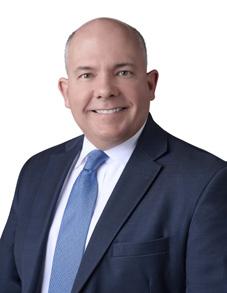 Robert J. Andretz randretz@fraserlawfirm.com
Robert J. Andretz randretz@fraserlawfirm.com
Lansing, MI – Fraser Trebilcock is pleased to announce the hiring of attorney Robert J. Andretz who will work primarily in the firm’s Lansing office.
Helping clients for more than two decades, Rob is an experienced criminal defense and professional licensing attorney who has successfully represented clients in both state and federal courts in felony and misdemeanor cases in more than 50 counties across the state of Michigan. He is passionate about what he does, and, understanding the direct and collateral consequences that a criminal conviction or professional licensing sanction can bring, he compassionately works with his clients to focus on what matters most to them.
Rob is no stranger to leadership roles and is comfortable taking on new challenges, having previously served as President of both the Clinton County Bar Association and the Catholic Lawyers Guild of the Diocese of Lansing.
Outside of work, Rob enjoys reading, canoeing, hiking, traveling, and spending time with his family. Committed to community service, Rob has served on the Briggs District Library Board of Trustees and the Victor Township Planning Commission. Rob has also served as a Cub Scout Den Leader and volunteers annually with “Adopt a River,” a program aimed at cleaning up the Lansing River Trail along the Grand and Red Cedar rivers.
“We are excited to have Rob join the firm and are confident that he will continue the mission of providing excellent legal services to our clients,” said Thaddeus E. Morgan, President of Fraser Trebilcock.
Fraser Trebilcock is one of Michigan’s longestestablished full-service law firms. Since 1883, Fraser Trebilcock has been providing preeminent legal services and representation to small and large businesses, individuals, governmental entities, and associations. Through its association with SCG Legal, Fraser Trebilcock has access to a global network of independent law firms. More information is available at fraserlawfirm.com | scglegal.com.
 Sally Babbitt sally@sallybabbittlaw.com
Sally Babbitt sally@sallybabbittlaw.com
As everyone in the probate world must know by now, Judge Byerley retired from the Eaton County Probate Court bench at the end of December 2023 after almost 13 years of service. I was honored to sit down and talk with him recently and get his opinion and advice on various topics now that he has had an opportunity to sit back and reflect on his time working with us.
The Eaton County Probate Court also includes the Family Law Court; therefore, Judge Byerley heard a wide range of cases. He estimated that the allocation of case types was around 10% Estates and Trusts, 15% Guardianship and Conservatorship, 15% Mental Health Cases, 40% Abuse and Neglect, 10% Juvenile Delinquency, 5% Divorces, and 5% PPO’s. He developed his docket schedule to handle Mental Health issues on Mondays and Tuesdays, uncontested matters on Wednesdays, contested probate matters on Thursdays, and Fridays were typically reserved for PPO Hearings and
other miscellaneous issues that needed to be resolved. Approximately 70% of probate cases were in pro-per as well as about 90% of PPO cases, and many DO (divorce without minor children) cases. These estimates reflect the fact that roughly 80% of estate files are handled exclusively by the probate register and do not require judicial intervention.
Now that Judge Byerley is off the bench, I was able to ask the questions that every lawyer wants to know but the sitting Judge can’t answer. Contrary to what we all would like to think, the Judge doesn’t play favorites and doesn’t base their decision on whether they like or dislike the attorneys, or even if they think the lawyers are difficult. So, I asked him what things bothered him about lawyers’ practices and what lawyers can do to make their judicial experience better for the court and the client. I wasn’t surprised that his first answer involved being prepared for court. He recommends doing your homework first and reaching out to opposing counsel to discuss the case before coming to court. In addition, he recommends having an order prepared before the hearing so that you can leave with a signed order in place. I think we’ve all had the unfortunate experience of getting a decision from the court but then playing the paper chase trying to get it signed by stipulation or filing under the 7-Day Rule. Neither is efficient, and both can often be aggravating. He also advised that if you’re going to be submitting exhibits to the court, have them marked
and distributed before the hearing or trial. In addition to preparedness, Judge Byerley suggests that opposing counsel not treat each other like the villain or make it personal. He advises that attorneys maintain civility at all times, and that they should start settlement negotiations early in the case. The famous strategy of waiting to settle a case on the courthouse steps is not only risky and inefficient, but if the case is settled, it leaves a hole in the court’s docket that they could have otherwise filled but will remain empty.
Knowing that the practice of law and the court system are constantly undergoing changes in compliance requirements at rapid speeds, particularly after COVID, I asked about the biggest challenges that the courts are facing. The answer was easy---- staffing. The labor market is short right now, and the staff wages don’t always keep up with the market. The staff works non-stop all day long and spend their lunch time eating at their desks while they work just to try to keep up. Lack of training is also an issue. With the increasing availability of electronic filing and video systems, more requirements are being made for electronic filings. Yet, the individual courts don’t necessarily have the software to accommodate it, so many courts are having to print electronic filings and either keep a full paper copy file or take the time to scan and save it to the court’s own system. Using video services for hearings also has its issues. While it got us through
COVID, it has led to more distractions and informalities, and in some cases, can be detrimental to the integrity of the proceedings. In addition to staffing issues, it’s sometimes difficult to work with unrepresented parties. Their lack of formality and respect for the court, their lack of knowledge of court rules and laws, and their lack of civility sometimes requires a security guard escort out of the court.
Finally, I asked Judge Byerley about his personal opinions, likes and dislikes, and plans for retirement. He told me that he liked doing adoptions the most and abuse and neglect cases the least. He
wasn’t really bothered by his decisions being appealed because he understands that the parties have the right to do so. He had very few cases come back to him on remand and only one decision was reversed. When asked about the public perception that too many frivolous lawsuits are filed, he recalled only two cases that he considered frivolous when attorneys were involved, but quite a few that he believed to be frivolous when the parties were in pro per, especially when the cases were brought by landlords. Because of the increase we have seen in contested probate matters, I asked whether he thought most of the disputes were simply about the money or whether
there were underlying issues driving them. He believes that most of them probably involve underlying family issues.
What’s next for Judge Byerley? He told me that he will miss the courtroom practice, listening to the legal arguments and the lawyering, and making decisions, and he will miss the people he worked with. However, he is looking forward to spending more time with family, not having to wear a necktie, riding his bike, and not having sleepless nights before a neglect and abuse case. We wish him well in the next chapter!
ICBA may offer scholarships to prospective members who may be experiencing a hardship and cannot pay the standard rates to be an active member of the Bar.
Recipients will remain anonymous. It is up to the discretion of the ICBA President to grant scholarships, but it can only be approved on an annual basis (i.e. this is not a benefit that automatically renews year-to-year).
The scholarship application can be accessed here
 Stephen Sinas Sinas Dramis Law Firm stevesinas@sinasdramis.com
Stephen Sinas Sinas Dramis Law Firm stevesinas@sinasdramis.com
It is well known that when motorcyclists crash, they often sustain severe injuries. Michigan no-fault insurance benefits can be available to an injured motorcyclist, but only if it can be proven that the motorcyclist suffered injuries arising out of the use of a motor vehicle as a motor vehicle under MCL 500.3105. The determination of whether an injured motorcyclist is legally entitled to nofault benefits is critically important, given that no-fault benefits can greatly help fund the injured motorcyclist’s care and recovery. Unfortunately, there has been controversy regarding the nuances of how the arising out of causation test under MCL 500.3105 should be applied in motorcycle cases. This controversy especially emerges in situations wherein a motorcyclist crashes after swerving in reaction to a moving motor vehicle but there is no physical contact between the
motor vehicle and the motorcycle.
Recently, the Michigan Supreme Court (MSC) had a chance to bring some much-needed clarity to the controversy regarding how the “arising out of” test should apply to motorcycle swerve cases. This opportunity came when MSC initially granted oral arguments on the plaintiff’s Application for Leave in the case of Stuth v. Home-Owners Disappointingly, however, following oral argument on December 6, 2023, MSC denied the plaintiff’s Application for Leave. So, as further explained herein, the controversy remains, but perhaps the dissent written by Justice Megan Cavanagh, and joined by Elizabeth Welch, will help steer motorcycle swerve cases in a better direction.
In the Stuth case, John Stuth crashed his motorcycle after observing a white van traveling toward him in the opposite direction. He applied for no-fault PIP benefits related to the accident with Home-Owners, but Home-Owners denied his claim, arguing that his injuries did not arise out of the ownership, operation, maintenance, or use of a motor vehicle as a motor vehicle, as required under MCL 500.3105. The causation analysis focused on Stuth’s deposition testimony, in which he testified that at the time he swerved his motorcycle, he did so in reaction to the
van crossing over the first of two solid yellow lines dividing the two lanes of traffic, but not the second yellow line, before correcting and entirely returning to its lane. After confirming that the white van “immediately corrected” as soon as it crossed the first yellow line and not the second line, Stuth further testified in the affirmative when asked, “So if you had continued on the same path that you were traveling there would have been no accident, is that right?” The case proceeded to a bench trial in which the trial court found that the white van was present and involved in the accident for purposes of MCL 500.3105(1).
The Court of Appeals (COA) reversed the trial court’s finding that Stuth’s injuries arose out of the operation of a motor vehicle under MCL 500.3105(1). Central to the COA’s analysis was Stuth’s statement that he observed the white van resituate itself, such that no accident would have occurred if he had simply continued driving his motorcycle down the roadway as he had been. The COA characterized this as Smith “admit[ing] that he misjudged the situation and lost control of his motorcycle as a result.” In other words, the COA found there was no actual, objective need for [Stuth] to take evasive action, which is a prerequisite under Detroit Med Ctr v Progressive Mich Ins Co, 302 Mich App 392 (2013) (hereinafter “DMC”). The Court of
Stuth v Home-Owners: MSC Denies Leave, but Justice Cavanagh’s Dissent May Help Steer No-Fault Motorcycle Swerve Cases in a Better DirectionAppeals stated in pertinent:
“As Stuth’s testimony demonstrates, the van never crossed the second yellow line and no part of the van entered Stuth’s lane. And importantly, Stuth explained that had he continued on the same path he was traveling, there would have been no need for him to take evasive action to avoid a collision. In other words, Stuth admitted that he misjudged the situation and lost control of his motorcycle as a result. Therefore, Stuth’s decision to veer his motorcycle off the road was based on his incorrect, subjective belief that he needed to take evasive action to avoid a collision. Accordingly, we conclude that Stuth is not entitled to PIP benefits because the white van did not create an actual, objective need for the motorcyclist to avoid the van.
at nighttime with its lights on, whereas in this case, the driver of the white van committed a civil infraction by failing to stay within his lane while rounding a curve, thereby causing Stuth to take evasive action and crash. Such a response to an oncoming vehicle’s civil infraction is reasonable, argued Judge Kelly, irrespective of Stuth’s speculation that if he had not taken evasive action he would not have been hit by the vehicle:
objective need to take evasive action.”
MSC denies leave in Stuth, but Justice Cavanagh issues important dissent
While Stuth’s leaving the roadway was based on what he mistakenly thought the van was going to do, the trial court erred when it focused its analysis on the reasonableness of Stuth’s actions. Again, whether a motorcyclist is entitled to PIP benefits is an objective test that focuses on the nexus between the motor vehicle’s actions and the accident. The causal nexus was not present in this case because there was not any ‘actual, objective’ need to take evasive action that would have entitled Stuth to PIP benefits [quoting DMC].”
Judge Kelly dissented from the majority’s causation analysis and distinguished this case from DMC on the basis that in DMC, the subject vehicle did not do anything improper and was merely driving down a street
“In contrast, under the circumstances presented here—a van committing a civil infraction by not staying within a single lane while rounding a curve—I cannot agree that there was not an ‘actual, objective’ need for Stuth to have taken evasive action nor that the activity of the van did not contribute ‘to the happening of the accident beyond its mere presence.’ See id. In hindsight, Stuth may or may not have needed to take the actions he did for what he at the time deemed necessary in order to avoid a head-on collision with the white van. But, like the trial court, I believe that his actions in doing so were not objectively unnecessary. Indeed, because it is an objective, not a subjective standard, I would not consider dispositive Stuth’s after-the-fact speculation that if he had not taken evasive action he would have not been struck by the vehicle. The question is whether, under an objective standard, there was an actual need to take evasive action at the time of the crash. In light of the evidence showing that Stuth had a split second to react to the white van crossing one of the center lines and moving toward his lane of travel while it was navigating a curve, there was an actual,
Following the COA’s Opinion in Stuth, the plaintiff filed an Application for Leave with the MSC, which initially granted plaintiff’s Application for Leave, ordering the parties to address whether the plaintiff’s injuries arose out of the operation or use of a motor vehicle under MCL 500.3105(1), including whether there was a sufficient causal connection between the van that the plaintiff encountered and his injuries to entitle him to personal protection insurance benefits. But after the oral argument regarding plaintiff’s Application for Leave, the MSC denied the Application for Leave in a 5-2 Order dated January 26, 2024. Accordingly, the outcome in Stuth is now forever controlled by the COA’s holding that the plaintiff was not entitled to benefits.
Despite the MSC denying leave, Justice Cavanagh’s dissent, joined by Justice Welch, made important points that must be kept in mind for any lawyer or judge analyzing future motorcycle swerve cases. First, Justice Cavanagh addressed how the COA’s holding in DMC is not consistent with the MSC’s decision in Turner v ACIA, 448 Mich 22 (1995). Justice Cavanagh explained how Turner stands for the proposition that under the “arising out of” causation standard, the primary consideration in the causation analysis “must be the relationship between the injury and the vehicular use of a motor vehicle.” And that “the relationship between the use of the vehicle as a motor vehicle and the injury must be more than incidental, fortuitous, or ‘but for,’ and the vehicle’s connection
with the injury should be directly related to its character as a motor vehicle.” Page 3 of the Dissent, citing Turner, supra. Justice Cavanagh further explained that, on the other hand, DMC focused on the conduct of the motorcyclist. Justice Cavanagh went onto to state:
“ . . . Remember, the statutory requirement is that an injury ‘aris[es] out of the . . . operation . . . of a motor vehicle as a motor vehicle . . . .’ MCL 500.3105(1). But, apparently on the basis of its own belief that it should inject fault into the no-fault act, the DMC panel fashioned a requirement for ‘an actual, objective need for the motorcyclist to take evasive action’ that goes beyond a “motorcyclist’s subjective, erroneous perceived need to react to the motor vehicle” for an accident to arise out of the operation of a motor vehicle. Not only does this rule have no basis in the statute, it also does not actually tell us very much, unless it is used as a sort of hindsight decision-making evaluator, i.e., saying there is an ‘actual, objective need’ for evasion only if contact would have resulted but for the evasion.”
Future motorcyclists litigating their entitlement to no-fault PIP benefits should consider using Justice Cavanagh’s reasoning that, as a matter of precedent, the arising out of causation principles set forth in Turner should be applied to their case, and that the reasoning in DMC should not be applied in such a way that inherently conflicts with Turner.
Justice Cavanagh’s dissent also provides a compelling explanation regarding why the DMC rule is so unworkable and
nearly impossible to apply, especially when the no-fault benefits are supposed to be payable regardless of fault:
“The DMC rule is also difficult, if not impossible, to apply. The DMC rule checks for fault in a decision to take evasive action on the basis of what would have happened if the evasive action had not happened. But there is no way to know for sure what would have happened in the alternate reality the rule contemplates. Take the facts of this case for example. The Court of Appeals panel opined that there would not have been a collision if plaintiff had not taken evasive action because the van coursecorrected. But how do we know the van’s course correction was not in response to the motorcycle’s evasive action? We don’t. And in practice it will always be a dubious effort at best to dissect the fastmoving and chaotic events of a motor vehicle accident to divine how events would have transpired with different choices over fractions of seconds. The only way to evaluate the merits of any decision is on the basis of the information available to the decision-maker. Using the DMC rule is a bit like waiting until after a coin toss comes up tails to fault anyone who picked heads beforehand.” (footnotes omitted).
Perhaps most importantly, Justice Cavanagh went on to explain that even if the DMC rule is salvaged and applies going forward, courts should apply the rule so the focus is on whether the motor vehicle created an actual, objective need for the motorcyclist to take evasive action to avoid danger, as opposed to an actual, objective need to take evasive
action to avoid contact with the motor vehicle:
“The rule from DMC is not worth salvaging in my opinion. It has no basis in statute and does not give any reasonable meaning to the statutory phrase at issue: “arising out of the . . . operation . . . of a motor vehicle as a motor vehicle . . . .” MCL 500.3105(1). However, since this Court has chosen to deny leave, there is a way to mitigate the harm going forward. Rather than asking whether there is an “actual, objective need” to take evasive action to avoid contact, as the panel below reasoned, the rule should be understood to ask whether there is an “actual, objective need” to avoid danger.
This framing of the DMC rule better describes how careful drivers make decisions in the real world. Generally, drivers do not proceed into dangerous situations until the last possible moment, hoping other drivers will save them. And we should not encourage them to do so. Generally, careful drivers take appropriate defensive action when they perceive danger. The Court of Appeals judge who dissented in part would have reached a reasonable result even under DMC.”
Importantly, Justice Cavanagh’s reasoning regarding the proper application of the DMC rule is supported by the Court of Appeals Opinion in DMC in which it stated that “…for the motor vehicle to be considered involved in the accident, the operation of the motor vehicle must have created an actual need for the motorcyclist to take evasive action. That is, there must
be some activity by the motor vehicle that contributes to the happening of the accident beyond its mere presence.” DMC, supra, at 398-399. To be sure, at no point in DMC did the Court of Appeals explicitly hold that motorcyclists have to prove that their evasive action was necessary to avoid actual contact with the motor vehicle.
It would have been best for the MSC to grant the plaintiff’s Application for
Leave in Stuth and provide further clarity to the proper analysis that should apply to no-fault motorcycle swerve cases. Unfortunately, that did not happen, so we are left to continue to argue about how the difficult nuances of the DMC rule should be applied to future cases. However, going forward, motorcyclists should use Justice Cavanagh’s dissent to continue to fight for further clarification regarding how “arising out of” causation principles should be applied to their cases.
Furthermore, in the event, motorcyclists are stuck with the DMC rule, the rule should be applied in the manner explained by Justice Cavanagh, with the focus being on the motorcyclist’s objective need to avoid danger, and not their objective need to avoid actual contact with the motor vehicle. If the DMC rule is applied in this manner, nofault motorcycle swerve cases will head in a better direction going forward.
Above The Bar Marketing
Alane Family Law PC
Blanchard & Walker PLLC
Buhl Little Lynwood & Harris PLC Capital Region Community Foundation
Chartier & Nyamfukudza PLC
Clark Hill PLC
Dickinson Wright PLLC
Dykema
Fahey Schultz Burzych Rhodes PLC
Fortz Legal
Foster Swift Collins & Smith PC
Fraser Trebilcock Davis & Dunlap PC
Grewal Law PLLC
Ingham County Prosecutor’s Office
Mallory, Lapka, Scott & Selin, PLLC
Miller Canfield Paddock and Stone, PLC
Murphy & Spagnuolo PC
Resolution Services Center
Sinas, Dramis, Larkin, Graves & Waldman P.C.
Speaker Law Firm PLLC
SuperiorX Investigations
Warner Norcross & Judd LLP
Willingham & Cotè PC
Abood Law FirmNew requirements for Michigan private practice attorneys effective September 1, 2023. Read the Supreme Court Order here. Required information will be collected during license renewal beginning the 2023-2024 Bar Year. Although not required until September, starting this summer, attorneys can nominate their designated interim attorney through the State Bar of Michigan’s online Member Area

April Alleman aalleman@michbar.org
Pursuant to SBR 2(B)(2) and SBR 21, effective September 1, 2023, all private practice attorneys are required to have an interim administrator plan as part of 2023-2024 license renewal.
If you have nominated an interim administrator but they have not accepted the nomination, you have NOT fulfilled your requirements.
To fully comply with the requirements, a private practice attorney who nominates an individual attorney* or a law firm* as interim administrator must have their interim administrator accept the nomination. If an interim administrator has not accepted the nomination prior to March 15, 2024, the private practice attorney will be automatically enrolled in the State Bar of Michigan’s Interim Administrator Plan for the current 20232024 Bar year and charged the $60 annual enrollment fee.
You can nominate a different attorney by logging into the Member Area and selecting “Interim Administrator Planning” under the Rule 21 heading. Please cancel your current nomination prior to creating a new nomination.
If you are not currently a private practice attorney, you may also update your status by logging into the Member Area and selecting “Interim Administrator Planning” under the Rule 21 heading and answering “no” to the private practice question.
*See SBR 21 and MCR subchapter 9.300
Contact Info:
Email: IAP@michbar.org
517-346-6355
www.michbar.org/Rule21
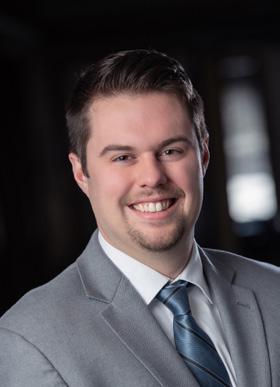 Cole Hedrick chedrick@fsbrlaw.com
Cole Hedrick chedrick@fsbrlaw.com
Hedrick is an Attorney at Fahey
Schultz Burzych Rhodes PLC, where he is a member of the firm’s Water Resources Group. Cole specializes in water resources management and policy, providing expertise in the legal aspects of complex public infrastructure projects, including property purchases, easement acquisition, and condemnation. He frequently works hand-in-hand with drain commissioners, water resources commissioners, public works commissioners, and engineers to guide them within the appropriate statutory framework. Cole possesses considerable
knowledge regarding review of developments under the Michigan Land Division Act and the Michigan Condominium Act, including necessary stormwater infrastructure and impact review. Cole is also an adjunct professor at Michigan State University College of law, co-teaching its Land Use and Planning course.
others. As part of an internship, I was able to witness attorneys practicing in court and quickly became intrigued. After working for a year, I decided to take the LSATs, and once I visited Michigan State University the rest was history.
5.) What advice do you have for those considering law school?
1.) Where do you work and what do you do there?
Fahey Schultz Burzych Rhodes PLC. I work with our Water Resources Group representing Drain Commissioners, Water Resource Commissioners, Public Works Commissioners, and Municipalities on various public infrastructure projects and litigation.
2.) Where did you go to school?
For undergrad, I attended University of Illinois - Springfield. For Law school, I attend Michigan State University.
3.) When were you admitted to practice in Michigan? October, 2017.
4.) Why did you go into the legal field?
In undergrad, I majored in criminal justice because I knew I wanted to help
A) Be curious. The field of law is extremely broad, so find your passion, and go after it.
B) Build good study habits. Law school and the practice of law requires great self-discipline, and setting good habits early will lead to success.
C) Be excited. Law school shapes your mind, but also your life. (I met my wife during my first day of law school)
6.) If you weren’t a lawyer, what would you do?
I’d be an engineer. Working on public infrastructure projects, I interact with professional engineers on a daily basis, and I have a tremendous amount respect for the work they do.
7.) Where did you grow up?
I was born in Dubuque, Iowa, but I moved to Rochelle, Illinois when I
Featured Young Lawyer continued was 9, which is known as the Hub city because it is at the intersection of major transportation routes (highways and railways).
8.) Who is your biggest role model and why?
My Grandpa, Roger Hedrick, is my biggest role model. He passed away in 2019, but has forever left an impression on my life. He helped raise me and
showed me first-hand how to treat people. He was always willing to help others and was toughest person I have ever met.
9.) What do you do in your free time?
My wife and I are big MSU sports fan, especially men’s basketball (we attend nearly every home game). I also love hunting and being outdoors every chance I get.
10.) Do you have any pets? If so, tell us about them.
Yes, a 10 year old beagle and basset hound mix named Kevalee that me and two of my law school roommates adopted during our second year. She sleeps a solid 20-hours a day, but is always ready to play.

 Marisa Vinsky marisa@cndefenders.com
Marisa Vinsky marisa@cndefenders.com
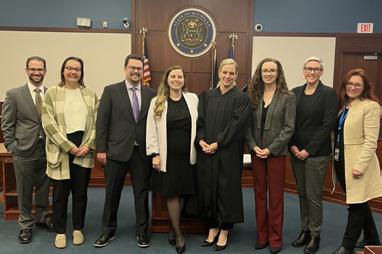
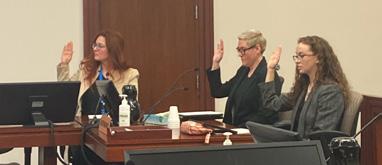
On November 15, 2023, the Ingham County Bar Association’s Young Lawyer Section hosted a Swearing In Ceremony at Veterans Memorial Courthouse before the Honorable Morgan E. Cole. ICBA-YLS Board Member Aaron Levin moved for the admission of three individuals to the Michigan Bar. ICBA-YLS wants to thank Judge Cole for participating and adding a personal touch to the ceremony for the participants to remember their special day. We are excited for the new members of the Michigan Bar, and we cannot wait to see all of their contributions to our legal community!
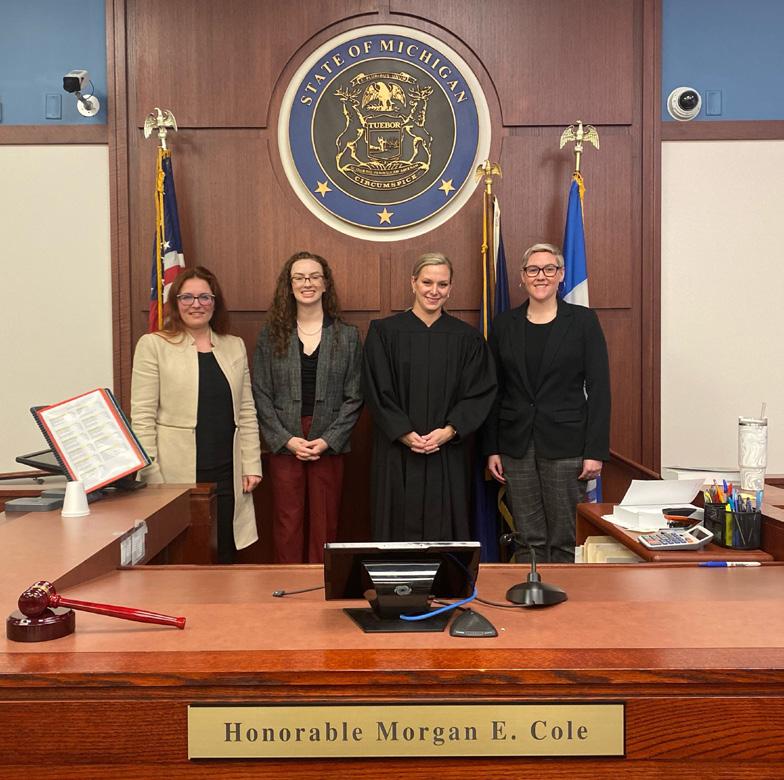
 Melisa M. W. Mysliwiec mmysliwiec@fraserlawfirm.com
Melisa M. W. Mysliwiec mmysliwiec@fraserlawfirm.com
Ready or not . . . big changes are coming with respect to powers of attorney in Michigan. The Uniform Power of Attorney Act (UPOAA or Act), 2023 PA 187, was signed into law in November 2023 and goes into effect July 1, 2024. It repeals Michigan’s current statutory law on durable powers of attorney, specifically Sections 700.5501-700.5505 of the Estates and Protected Individuals Code (EPIC). The UPOAA is not part of EPIC, instead, it is a stand-alone statute located at MCL 556.201 et. seq.
The UPOAA applies to all written records that grant authority to an agent to act in one or more matters on behalf of a principal (which is how the Act defines “power of attorney”)1, with certain exceptions that are nearly identical to the exclusions currently set forth in EPIC2 Powers of attorney executed in Michigan before July 1, 2024, under what will soon be considered the “old” law will remain valid so long as they complied with the laws of this state that existed at the time they were executed.3
To be effective, a power of attorney
created on or after July 1, 2024, must be signed by the principal or by another individual directed by the principal to sign the principal’s name in their conscious presence.4
If a power of attorney is signed by the principal and either (1) acknowledged by the principal before a notary public or other individual authorized to take acknowledgments or (2) signed in the presence of 2 witnesses who also sign the power of attorney and are not an agent nominated in the power of attorney, it is considered to be durable, i.e. not terminated by the principal’s incapacity,5 unless it expressly provides that it is terminated by the incapacity of the principal.6 However, if a power of attorney is signed in the principal’s conscious presence by another individual directed by the principal to sign the principal’s name, it is only considered durable if it does not expressly provide otherwise,7 and if it is signed in the presence of 2 witnesses who also sign the power of attorney and are not an agent nominated in the power of attorney, regardless of whether the power of attorney is acknowledged.8
There are statutory benefits to having powers of attorney acknowledged by the principal. Powers of attorney that are acknowledged carry a presumption of genuineness.9 Whereas those that are merely witnessed, but not acknowledged, are not entitled to the same presumption of genuineness10, which prevents those presenting the power of attorney for acceptance by third parties from relying on the
protections offered under sections 119 and 120 of the UPOAA.11 Subject to certain exceptions, section 120 of the UPOAA provide that a person shall either accept an acknowledged power of attorney or they may request an agent’s acknowledgment or a certification, translation, or opinion of counsel not later than 7 business days after the power is presented for acceptance.12 And, further, subject to certain exceptions, if such a request is made, the person must accept the power of attorney not later than 5 business days after receipt of the timely requested items (agent’s acknowledgment or certification, translation, or opinion or counsel).13 A person that refuses, in violation of the Act, to accept an acknowledged power of attorney is subject to a court order mandating acceptance of the power and liability for reasonable attorney fees and costs incurred in bringing that action14; and if such refusal occurs after having requested and received a certification, translation, or opinion of counsel, the person is additionally liable for reasonable attorney fees and costs incurred in providing the requested certification, translation, or opinion of counsel.15
In preparation for the UPOAA’s July 1 effective date, practitioners should consider drafting a certification of the validation of a power of attorney and agent’s authority for such situations or practitioners should save the UPOAA’s optional template set forth in Section 30316 of the Act. Practitioners should also give thought to whether they will
sign such certifications on behalf of agents or principals they represent, or whether, instead, they will prepare such certifications only for an agent’s signature.
Practitioners will also need to determine whether they will review and update their current power of attorney forms to comply with the UPOAA or whether they will defer to using the new statutory form power of attorney, which is set forth in section 30117 of the Act. There is also an optional template for the agent’s acknowledgment set forth in section 30218 of the Act.
Some things to keep in mind when reviewing and potentially updating current powers of attorney to comply with the UPOAA include:
• A power of attorney is effective when executed unless it provides in the power of attorney that it becomes effective at a specified future date or on the occurrence or a specified future event or contingency.19
• Execution of a power of attorney under the UPOAA does not revoke a previously executed power of attorney unless the subsequent power of attorney provides as much.20
• If a principal designates 2 or more persons to act as coagents, unless the power of attorney provides otherwise, each coagent may exercise the authority granted in the power independently.21
• A principal may grant authority to designate one or more successor agents to an agent or other person designated by name, office, or function.22
• Unless the power of attorney provides otherwise, an agent is entitled to reimbursement of expenses reasonably incurred on behalf of the principal and reasonable compensation for services rendered on behalf of the principal.23
• Certain powers may not be exercised by an agent unless the power of attorney expressly grants the agent the authority to do so, or the authority is granted by judicial order. These include the power to24:
○ create, amend, revoke, or terminate an inter vivos trust;
○ make a gift;
○ create or change rights of survivorship;
○ create or change a beneficiary designation;
○ delegate authority granted under the power of attorney;
○ waive the principal’s right to be a beneficiary of a joint and survivor annuity, including a survivor benefit under a retirement plan;
○ exercise fiduciary powers that the principal has authority to delegate;
○ exercise authority over the content of electronic communications sent or received by the principal;
○ and exercise authority over any bank, securities, or other financial account in a foreign country.
• Notwithstanding an express grant of authority in the power as set forth above, an agent who is not an ancestor, spouse, or descendant of the principal cannot create in the
agent, or in an individual to whom the agent owes a legal obligation of support, an interest in the principal’s property, whether by gift, right of survivorship, beneficiary designation, disclaimer, or otherwise unless the power of attorney provides otherwise.25
• Sections 204 to 217 of the Act set forth several general powers that a principal can grant to an agent. They include powers related to:
○ real property26;
○ tangible personal property27;
○ stocks and bonds28;
○ banks and other financial institutions29;
○ operation of an entity or business30;
○ insurance and annuities31;
○ estates, trusts, and other beneficial interests32;
○ claims and litigation33;
○ personal and family maintenance34;
○ benefits from governmental programs or civil or military service35;
○ retirement plans36;
○ taxes37; and
○ gifts38
• The Act provides that any portion or all of these general powers (listed in sections 204 to 217) can be included in a power of attorney by citing the section in which the authority is
described or referring to a heading or catchline of sections 204 to 217.39 If the power of attorney specifically incorporates, by reference, any of those sections, the entire section is incorporated as if that section were set out in full in the power of attorney.40
• The Act further specifies that if a power of attorney grants an agent authority to do all acts that a principal could do, the agent has all of the general authority described in sections 204 to 216.41
While there may be mixed feelings among some practitioners on passage of the UPOAA, regardless of one’s feelings on the matter, practitioners must be ready for this change in the law and adapt. The good news is that practitioners have the option of adopting the statutory form power of attorney and the other optional templates in
Article 3 of the Act as their own, or if they’d prefer, they may continue to use their own power of attorney forms as they’ve always done. I trust that most practitioners will find implementation of the UPOAA does not necessitate a significant number of edits to their current documents, but I also suspect that many will find they prefer the powers as set forth in the Act to their own provisions and may even adopt them as their own over time.
Endnotes
1 MCL 556.203 and MCL 556.202(l).
2 MCL 556.203 and MCL 700.5501(7).
3 MCL 556.206(1).
4 MCL 556.205(1).
5 MCL 556.205(2).
6 MCL 556.204.
7 Id.
8 MCL 556.205(3).
9 MCL 556.205(4).
10 MCL 556.205(5).
11 Id.
12 MCL 556.220(1).
13 MCL 556.220(2).
14 MCL 556.220(4).
15 MCL 556.220(5).
16 MCL 556.403.
17 MCL 556.401.
18 MCL 556.402.
19 MCL 556.209(1).
20 MCL 556.210(6).
21 MCL 556.211(1).
22 MCL 556.211(2).
23 MCL 556.212.
24 MCL 556.301(1).
25 MCL 556.301(2).
26 MCL 556.304.
27 MCL 556.305.
28 MCL 556.306.
29 MCL 556.308.
30 MCL 556.309.
31 MCL 556.310.
32 MCL 556.311.
33 MCL 556.312.
34 MCL 556.313.
35 MCL 556.314.
36 MCL 556.315.
37 MCL 556.316.
38 MCL 556.317.
39 MCL 556.302(1).
40 MCL 556.302(2).
41 MCL 556.301(3).
Please take note that the Ingham County Bar Association does not do Lawyer Referrals. If you need to use this service provided by the State Bar of Michigan, please call them at (800) 968-0738 between the hours of 9:00 a.m. and 5:00 p.m., Monday through Friday, to speak with a lawyer referral representative or you can use the links below.
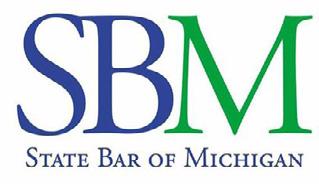





 Marisa Vinsky marisa@cndefenders.com
Marisa Vinsky marisa@cndefenders.com
The Ingham County Bar Association Young Lawyers Section wanted to put a fun twist on the traditional holiday party season by hosting an Ugly Holiday Sweater Party! This event took place at the Lansing Shuffle, and members and friends of ICBA-YLS were able to mix and mingle while enjoying games and delicious food and drinks. We even had an ugly sweater contest, where the winners received gift cards as their prize. Thank you to everyone who stopped by and hung out with us!






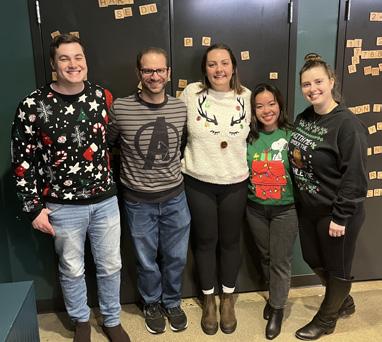

 Ryan J. Buck rbuck@ingham.org
Ryan J. Buck rbuck@ingham.org
When my mother lambasts Judges for “not simply applying the law,” I find myself chuckling – internally of course. Conversations over politics, money, and religion are definitely on the prohibited list of topics. The law may need to be added to that list because “simple” and “application” are rarely bedfellows. This is certainly true in probate law. And there arises my title for this article and my attempt to clear up some of those nitpicky, frequently tripped over nuances for your practice before the Ingham County Probate Court.
Duration of Appearance. A client could have a traumatic brain injury and a need for a conservator for the rest of their life – a life that could stretch for 30+ years. Generally, an attorney’s appearance on behalf of a fiduciary applies until the proceeding is completed, the client is discharged by the Court, or an order terminating the appearance is entered. MCR 5.117(C). While more than a few
have tried, an attorney cannot withdraw their appearance simply by notifying the Court. It does not work like that. The Court would expect to see a stipulation or petition to substitute or withdraw the attorney. Consider carefully when you sign onto a probate case because unlike more litigation-focused areas of law, the completion of the proceeding could be far into the future.
Those Dastardly Forms. If the State Court Administrative Office (“SCAO”) has created a form for a particular purpose, it must be utilized when filing with the Court. MCL 600.855 and MCR 5.113(A). This concept is foreign when practicing before other trial courts, however it is a golden rule in probate world.
Note that utilizing SCAO-approved forms does not stop you from including attachments to the form. Sometimes your objection cannot be fully contained by the PC694 Objection form. Sometimes the names of all the interested persons served cannot fit on the PC564 Proof of Service. Two words create the ideal linkage: “See Attached.”
Hearing Practice. Hearings are scheduled upon filing, not prior to. Unless the Judge issues notice from the bench during a hearing, the Court will always prepare and provide you with a PC562 Notice of Hearing. You are encouraged to serve this court-prepared form instead of preparing your own.
Gone are the days of solely in-person hearings, so having the correct Zoom information is key. Let us save you time and effort. Use the Court’s Notice of Hearing.
Adjournments under MCR 2.503. The Court strives to hear matters between four to six weeks out from your filing date. This allows for the service of documents, counsel and guardians ad litem to do their work, and the Judge to prepare.
On occasion, circumstances may warrant your stipulation or petition to adjourn under MCR 2.503. And the Court would welcome a stipulation or petition under MCR 2.503. The Court would not welcome a phone call with a laundry list of reasons why the original date did not work. If you are not able to get a stipulation to adjourn the hearing, the Court has created an optional Petition to Adjourn and Order form. You are welcome to access it at the Court’s website, pr.ingham.org.
Proposed Orders and Letters. When filing your petitions, please include proposed orders and letters of authority for the Court to consider. Know that the Court will always assign an expiration date to letters of authority, and they will not be renewed until all deficiencies are cured. The letters of authority are automatically renewed if the necessary reports, notices, or other filings are timely submitted to the Court.
Read Over Your Work. The Court serves attorneys and pro per litigants, so the quality of the filings are often different. This is not an interesting fact. What is interesting is the rate of rejection of documents prepared for filing between attorneys and pro per litigants. The Court rejects more decedent estates prepared by attorneys than pro per litigants. Read the prior sentence again. Now read over your work again. Please.
Furthermore, please do not forget your PC566 Supplemental Testimony when there are non-heir devisees like a trust. Trust me, save yourself time and effort by double checking your work.
The Almighty Signature. An attorney occupies a unique position of fiduciary power. Perhaps the most prominent yet simple application of that power is by the application of your signature to a filing. But remember that your client is a signatory on many things as well in probate world.
When a person is represented by an attorney, the signature of the attorney is required on any paper filed on a SCAO form only if the form includes a place for a signature. An application, petition, or other paper may be signed by the attorney for the petitioner, except that an inventory, account, acceptance of appointment, and sworn
closing statement must be signed by the fiduciary or trustee. A receipt for assets must be signed by the person entitled to the assets. MCR 1.109(E).
Final Thoughts. The business of the Court is your clients’ moments of transition. That transition can be scary, but as attorneys, you work to get your clients through “the scary.” To aid you in that work, I hope this article has made the nuances of probate world less nuanced. And on a personal note, I hope you can help me prove to my mother that we can simply apply the law.
Thank you Sponsors
Abood Law Firm
Chartier & Nyamfukudza PLC
Clark Hill PLC
Dykema
Fahey Schultz Burzych Rhodes PLC
Foster Swift Collins & Smith PC
Fraser Trebilcock
Grewal Law PLLC
Murphy & Spagnuolo PC
Sinas, Dramis, Larkin, Graves & Waldman P.C.
Speaker Law Firm PLLC
Willingham & Cotè PC
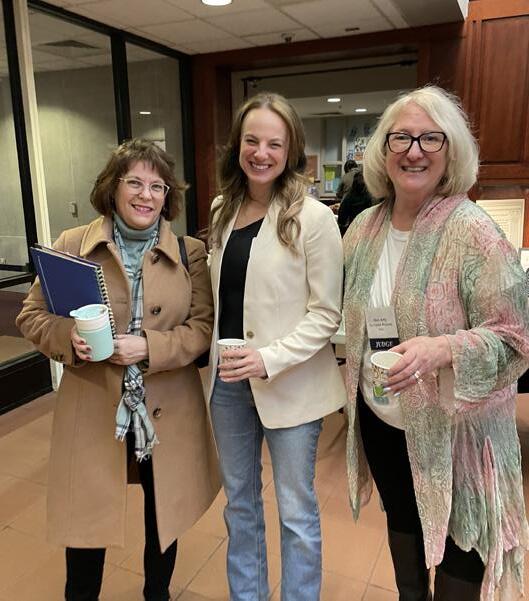

At our core, our role as attorneys is to serve our community. Many attorneys receive calls from potential clients, who are unable to speak English fluently, and thus, without paying a translator, the potential client is left without the ability to have meaningful communication with their attorney. When people face legal issues, they are understandably, overwhelmed. If in addressing their pending legal issues, they are unable to fully understand that which their attorney is advising, the situation is all the more overwhelming. And if you are one of those attorneys who have received such a call from a potential client, you are scrambling to try to find an attorney who does speak the potential clients’ language. But now In Ingham County, this is now a problem of the past!
ICBA has updated our website such that our members can now include their languages spoken to their individual profiles. We encourage all of our members to update their profiles accordingly. To update your profile to add languages spoken, please go to https://www.inghambar.org/signup/ your-membership/ At ICBA, we believe that not only will this allow our members to showcase their skills, but will also assist members of the public to find attorneys who speak their language.
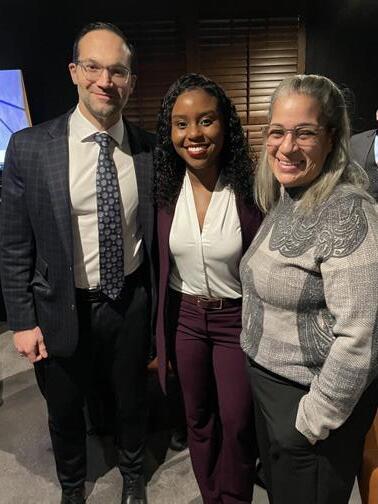



January 11, 2024 @ the Graduate East Lansing
Abood Law Firm
Alane Family Law PC
Buhl Little Lynwood & Harris PLC
Chartier & Nyamfukudza PLC
Clark Hill PLC
Dickinson Wright PLLC
Dykema
Fahey Schultz Burzych Rhodes PLC
Foster Swift Collins & Smith PC
Fraser Trebilcock
Grewal Law PLLC
Murphy & Spagnuolo PC
Resolution Services Center
Sinas, Dramis, Larkin, Graves & Waldman P.C.
Speaker Law Firm PLLC
Willingham & Cotè PC
The ICBA-YLS Executive Board would like to thank the area firms, attorneys, and legal professionals that donated for the 2023 Horn of Plenty! Cristo Rey Community Center was very grateful for the generous donations of personal items, clothing, and food.
We would like to shout out the participating firms:
Chartier & Nyamfukudza, P.L.C.
Clark Hill
Dickinson Wright PLLC
Fahey Schultz Burzych Rhodes PLC
Foster Swift Collins & Smith PC
Loomis Law Firm
Murphy & Spagnuolo, PC
Oade Stroud & Kleiman PC
Sinas Dramis Law Firm
Speaker Law Firm, PLLC
Willingham & Cotè PC


The Bankruptcy Law Section meets at noon on the fourth Thursday of each month (Quarterly – September, December, May) at Noon, Location: Zoom.
Upcoming Meetings:
• TBA
Please feel free to join the Bankruptcy Section for its monthly meetings. Contact Section Chair Lynn Osborne for details.
To RSVP for meetings, contact Lynn Osborne at lynnosbornepc@gmail.com
The Criminal Defense Law Section is comprised of criminal defense attorneys who defend people accused of committing crimes. The Section is dedicated to sharing knowledge related to emerging and important topics specific to criminal defense. The Section is also committed to offering opportunities for attorneys to hone critical skills needed to defend those accused by the government.
If you are looking for a way to learn about the latest in forensics or practice your evidentiary knowledge, they you’ll want to join
this section. If you have suggestions for future topics, please contact Section Co-Chairs Marisa Vinsky, Takura Nyamfukudza or Christopher Wickman.
Upcoming Meetings: Dates/Times will vary and will be announced via Listserv - Location: Zoom
There is no cost to attend meetings. Speakers and topics will be announced. To RSVP for the Criminal Defense Law Section meetings, email Chris Wickman at cwickman@nicholslaw.net
The Employment and Labor Law Section holds its meetings from noon to 1 p.m. each month at WMU-Cooley Law School, 300 S. Capitol Ave., Room 911, in downtown Lansing.
Section Chair is Kelly McClintock. Contact Kelly if you have ideas for topics and speakers.
Upcoming Meetings: 4th Tuesday of the month – Noon, Location: TBA
If you have questions about Section meetings, please email Kelly at mcclintock@bwlawonline.com.
The Family Law Section meets on the fourth Tuesday of the month from noon to 1 p.m. Location TBD. Lunch is provided.
Section Co-Chairs are Jennipher Martinez and Erica Terranova.
Upcoming Meetings: 2nd Wednesday of the month (no meetings June, July, August) at Noon, Location – Zoom
If you have suggestions for meeting topics, want to sponsor a lunch or just have general questions, please email erica@baileyterranova.com.
The Probate and Trust Section Chair is Ernscie Augustin. The Section holds its in person meetings the second Wednesday of every other month at Noon at Chalgian & Tripp Law Offices, PLLC, 1019 Trowbridge Road, East Lansing, MI 48823 (ZOOM option is available for those who are unable to attend in person). If you plan to attend the meeting in person, please RSVP to Ernscie at augustin@ augustinlawoffices.com.
Upcoming Meetings:
• January 10, 2024 - Judge Shauna Dunnings
• February 14, 2024 - No Meeting
• March 13, 2024 - Judge Shauna Dunnings and probate register, Ryan Buck
• April 10, 2024 - No Meeting
• May 8, 2024 - TBD
• June 2024 Summer Social – TBD
Please join the Section’s Facebook Group by searching “ICBA Probate & Trust Law Section” and connect with us on social media. As a way to streamline RSVPs and minimize emails, you can RSVP for the Section meetings via Facebook. Are you feeling generous? Please consider sponsoring lunch for our in-person meetings. Email Ernscie Augustin if you are interested.
The Paralegal/Legal Assistant Section offers free networking and educational events for legal staff in Ingham County. Meetings are held the third Wednesday of each month, virtual.
Section Co-Chairs are Elizabeth Cary, a Paralegal at Chartier & Nyamfukudza, PLC, and Megan Cochrane, a Paralegal at Loomis Law.
Upcoming Meetings: 3rd Wednesday of the month at Noon, Location – Zoom
If you have questions or would like to learn more about the Section, contact Elizabeth at lizzy@cndefenders.com.
The Real Estate Section holds its meetings at noon on the fourth Thursday of each month. Location TBD.
Section Co-Chairs are Bill Tomblin, Ellen E. Ward, and Mitchell Zolton.
Upcoming Meetings: 4th Friday of the month unless specified otherwise via Listserv (No meetings June, July, August, and December) — Noon
Location: TBA
Lunch is served at meetings. Upcoming speakers and topics will be announced. Member input is always appreciated.
If you plan to attend a meeting, please RSVP to Bill Tomblin at Wdtomblaw@aol.com
